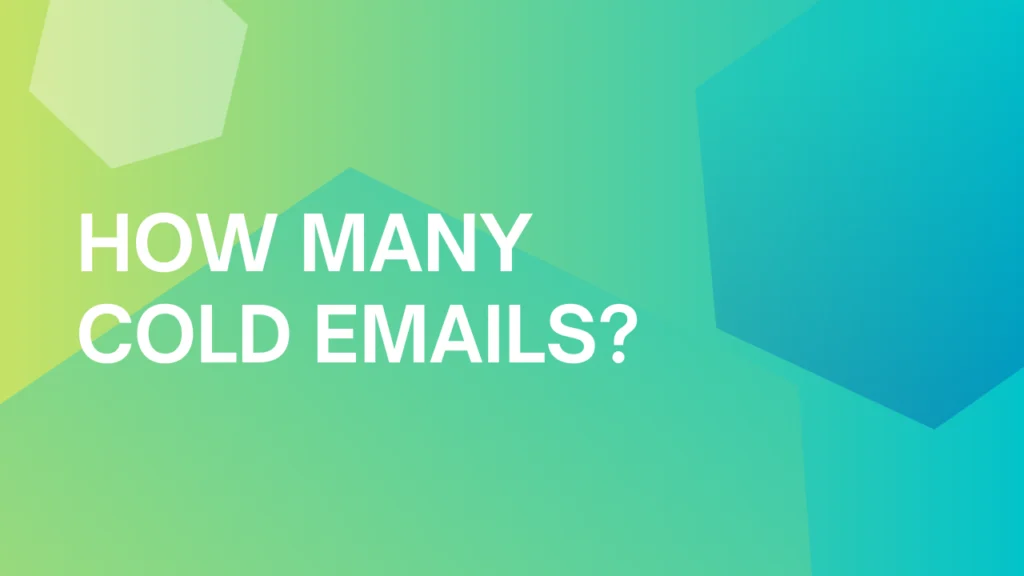
How Many Cold Emails to Send Per Day
When it comes to cold emailing, finding the right balance in the number of emails you send per day is critical. Sending too many can get you flagged as spam, but sending too few might slow down your outreach efforts.
So how do you find the right balance? In this article, we’ll look at:
- The optimal number of cold emails to send each day based on your goals and IP health
- Key factors that influence your daily sending limits, such as domain reputation and email engagement
- Practical tips for scaling up your email outreach safely without risking deliverability issues
1. Start with an Email Warmup Service
Whether it’s your first time orchestrating a cold email campaign from your current account or you’re revamping a previous strategy, the first step to avoid landing in the spam folder is to employ an email warmup service.

You can warm up your inbox manually, but the process is quite tedious and time-consuming. With the help of email warmup services, you can automate the process so you don’t have to worry about math and can focus on other business matters.
An email warming service will steadily send more emails from your account each day until you reach your target number of emails sent in a day.
2. Understand Daily Sending Best Practices
Consumers are overwhelmed with content on a given day.
Think about the number of emails that arrive in your personal inbox compared to those you actually open.
Every ESP has its own spam filter functions. But a universal red flag for all ESPs is an email account suddenly sending a ton of emails. So please be mindful of the number of cold emails you are sending per day.
Unfortunately, many spammers will create an email account and send their messages to as many people as possible before getting shut down. This 0-to-100 method ruins email blasts for the rest of us and makes warming up your inbox necessary for cold email campaigns.
The best practices for any type of cold emailing are the same:
- Only reach out to people who would be interested in your brand
- Reach out to them independently
- Make them feel special
- Stay on message
- Make use of a cold email sequence
- Leave them wanting more
- Hope for a response, but don’t pester them after you send a follow-up
- Utilize effective cold email templates to ensure consistency and professionalism in your outreach
- Leverage b2b cold email templates specifically designed to appeal to business audiences and increase engagement rates
Other good practices include verifying your emails before reaching out to the recipients, registering your domain for the proper security settings (SPF, DKIM, DMARC), and keeping your inbox warm.
And, of course, know and follow your ESP’s daily sending limit.
3. Know Your ESP’s Daily Sending Limit
Depending on the number of emails you want to send in a day, you may want to look into upgrading your ESP. We do not recommend sending email blasts from a free Gmail or Outlook account because scammers tend to use these and you will be flagged.
It’s also important to note that many ESPs equate “number of emails sent” with “number of recipients.” In short, trying to circumvent the limits by BCC-ing all of your recipients on a single message won’t work.
Here’s a quick list of some of the most popular ESPs and their sending limits.
| Email Service Provider | Sending Limit (Per Day) |
|---|---|
| Gmail (Free) | 500 |
| Gmail (Google Workspace) | 2000 |
| Outlook (Free) | 300 |
| Microsoft 365/Office 365 | 10000 |
| Zoho (Free) | 50 |
| Zoho (Paid) | 300 |
| Zoho (Custom) | 2500 |
| GoDaddy | 250 |
| RackSpace | 10000 |
| Yahoo! | 500 |
| BlueHost | 150 (per hour) |
| DreamHost | 100 (per hour) |
| Yandex.mail | 500 |
| HostGator | 12000 |
| Amazon SES | 10000 |
| Proton Mail (Free) | 150 |
| Proton Mail (Plus) | 1000 |
| Proton Mail (Professional/Visionary) | unlimited |
| AOL | 500 |
| Mailgun | 300 |
| SendGrid (Free) | 100 |
| SendGrid (Essentials) | Up to 100,000 per month |
| SendGrid (Pro) | Up to 1.5 million per month |
| Sendpost (Starter) | 10,000 per month |
| Sendpost (Growth) | 600,000 per month |
| Sendpost (Scale) | 3 million per month |
What Happens If I Exceed the Daily Sending Limit?
It depends on your ESP.
In many cases, like with Google, you won’t be able to send any more messages that day. Some services, such as Microsoft and Zoho, will hold your messages until the number of sent messages drops below the limit of the set timeframe.
Most ESPs won’t immediately suspend your account if you exceed the daily limit, but over-sending can lead to an account suspension if you continue to push the boundaries.
The best things you can do to ensure your emails are delivered are to send a lower volume of higher quality emails, employ a warming service to help you optimize your output, and use multiple email accounts to scale your outreach.
One of the ways to avoid reaching the sender limits is to split up your overall sending volume between multiple email addresses (services such as Mailstand can help you with that). This helps with deliverability and reduces the possibility of unexpected issues arising when putting a single email address under stress.
Why Sender Reputation Matters
Your sender reputation is important because it’s a score assigned to your inbox and domain to measure the security of delivering your message to the recipient.
Higher scores mean that your message will likely land in your readers’ inboxes.
Lower scores can get your messages into spam folders or your domain placed on a block list.
Having a positive sender reputation is essential for a successful cold email campaign because mail servers will use your sender reputation score to determine if you’re a trustworthy sender.
If your reputation gets too low, your messages will land in your recipients’ junk folders.
What Impacts Sender Reputation?
The top three culprits for a low sender reputation score are:
- High complaint rate
- High bounce rate
- Triggering spam traps
If too many users report your content as spam, it will damage your score.
If you’re sending emails to old accounts or try to exceed your ESP’s daily sending limit and end up with a high bounce rate, your reputation will be affected.
It’s best to avoid buying email lists of “people in your target audience” because that list will likely include at least one spam trap.
Spam traps are inactive or fake accounts used to weed out senders who are sending emails out to anyone and everyone.
Not only can landing in a spam trap harm your reputation, but it can also get you placed on a blacklist.
Routinely Clean Your Email List
Because your sender reputation relies on keeping your bounce rate low, it’s essential to clean your email list regularly. While some of us still hold on to the first email account we ever made, others phase out old email addresses in favor of new ones for various reasons.
As soon as you notice an email to a specific recipient has bounced, remove them from your mailing list. Continuing to send messages to an inactive account will damage your sender’s reputation.
Additionally, many old or inactive emails are turned into spam traps. Cleaning your mailing list can help you avoid an inadvertent message to a spam trap.
TL;DR
Cold emailing is one of the most effective marketing tactics for building relationships with new clients if you:
- Use an email warmup service to prepare your domain
- Keep in mind your ESP’s daily sending limits
- Keep your sender reputation high
- Constantly clean your list
- Following these suggestions can transform your cold email marketing campaign into a successful one.
Our platform comes with the tools you need to monitor and improve your sender reputation and deliverability rate. Discover Warmup Inbox completely free today.
| Tip: If you are preparing a wide-scale email campaign, you can book a 30-minute free consultation. |


